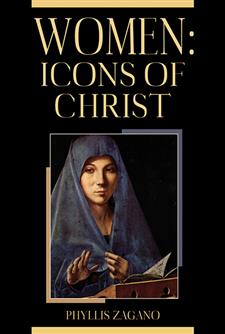
Icons of Christ makes a biblical and theological case for the ordination of women to the ministerial office of Word and Sacrament.
|
In his book, Icons of Christ: A Biblical and Systematic Theology for Women’s Ordination, William Witt offers a comprehensive challenge to the theological basis for male-only leadership in Protestant and Catholic traditions. While each tradition differs in its theological support for male-only church leaders, Witt exposes the devaluations of women at the level of being (ontological), a failure fundamental to both camps. This book is an excellent example of originality as Witt philosophically and systematically exposes the functional restrictions that logically result from biblical interpretations that devalue women for being female. While Witt reaches back to early examples and sources in making his case, he also includes the more prominent voices in today’s conversations, such as Alan Padgett. A competent and original thinker, Padgett is perhaps the most accessible theologian whose work is therefore a helpful option to cite. In this way, Witt provides readers with timely resources and competent scholars, like Padgett, and the basis for their support of women’s leadership.
Witt is to be commended for his groundbreaking methodology that exposes how both Catholic and Protestant theologians support male leadership by interpreting key passages in ways that esteem women as inferior to men—a view at odds with the entire canon. In doing so, Witt also reveals how this longstanding, but failed interpretative path also promotes a distorted worldview that devalues women simply because they are born female. This point needs to be made!
The structure of this book is well organized, and Witt is systematic in his approach. He addresses in depth, relevant themes needed in making his point. I do wish he would explore worldview more explicitly, and in terms of the human consequences of devaluations made at the level of gender. If one was to compare this publication to other similar titles, two come to mind; Alan Padgett’s As Christ Submits to the Church: A Biblical Understanding of Leadership and Mutual Submission; and also, Philip Payne’s Man and Woman: One in Christ: An Exegetical and Theological Study of Paul’s Letters.
The potential significance of this book is multifaceted. First, it provides readers, of many traditions, with biblical and theological tools to challenge embodied devaluation like gender—an interpretive move that is doomed to fail from the outset. Second, Witt provides bridges to unite egalitarian efforts not only across Protestant and Catholic lines, but also within these groups. Third, by exposing flawed biblical and theological methods, Witt also helps churches address moral issues that result because ideas have consequences. From my vantage point, devaluations at the level of being (implicit as they are in the church’s defense of male-only leaders) stymies human flourishing and our work as Christian humanitarians. It is nearly impossible to advance humanitarian goals without also promoting the equality of women. For this reason, the UN Millennium Development Goals elevate girls’ and women’s equality as a key humanitarian lever. Yet, too often churches and Christian NGOs are reluctant to partner with humanitarian organizations that embrace gender equality because of passages like those Witt addresses in his vital book. As Christians we must commit ourselves to human flourishing even as it begins by exposing and repenting of deeply held theological assumptions that devalue women and remove them from shared authority beside men, placing them at risk for abuse.
However, there are some weaknesses in the book. Witt is repetitive in certain places and leans too much on scholars like Alan Padgett when he could have included more women and theologians who are people of color. While the book is glorious in its theological and philosophical analysis, and while it will likely appeal to and help readers/students in the academy, the social consequences of theological patriarchy are equally vital. Ideas about God—theology—have the greatest impact of all. Theological and philosophical devaluations supported, for example, slavery in the US, apartheid, the holocaust, Jim Crow, and the genocide in Rwanda.
Overall, I appreciate how thorough the author is in his biblical, historical, and theological exploration. He certainly engages relevant voices on both sides of the gender debate. Witt’s approach is novel and needed—showing how major branches of Christians (Protestants and Catholics alike) devalue women at the level of being which furthers “theological” objections to women’s leadership. Such an approach would likely unite egalitarians within and between traditions. I was recently part of a study tour beside Catholic nuns working on this very project. Witt’s book would be a helpful bridge in our shared advocacy. Additionally, Witt’s methodology has a broader humanitarian application in helping Christians see how devaluing ideas lead to devaluing practices. Distortions of human embodiment (gender, race, etc.) lead to prejudice and abuse, as history shows. Yet, sadly, Christians are slow to see how distorted theology can have deadly consequences. Witt has prominence among Christian theologians and offers an intellectual challenge most needed.
|
ABOUT THE AUTHOR
Dr. Mimi Haddad is president and CEO of Christians for Biblical Equality (CBE) International. She is a graduate of the University of Colorado and Gordon Conwell Theological Seminary (Summa Cum Laude). She holds a PhD in historical theology from the University of Durham, England. Palmer Theological Seminary of Eastern University awarded Mimi an Honorary Doctorate of Divinity in 2013. Haddad is part of the leadership of Evangelicals for Justice. She is a founding member and leader of the Evangelicals and Gender Study Group at the Evangelical Theological Society. She was a convener of the Issue Group 24 for the 2004 Lausanne III Committee for World Evangelization.
|